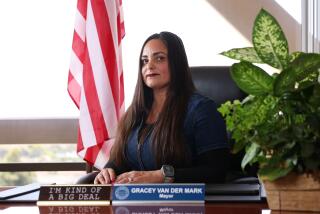Honig, PTA Sue to Bar TV Ads in Classrooms : Education: Injunction is sought to block Channel One, a daily public affairs program for students that contains commercials aimed at young people.
SACRAMENTO — Seeking to ban television advertising from California public school classrooms, state Supt. of Public Instruction Bill Honig and the state PTA filed suit Wednesday against a high school that subscribes to Channel One, a daily public affairs program that includes commercials.
The suit also names Whittle Communications of Knoxville, Tenn., producer of the 12-minute program, which includes two minutes of commercials for such products as Burger King, Gatorade and Nike athletic shoes.
Honig and the PTA are seeking a temporary injunction in Santa Clara County Superior Court that would prevent Overfelt High School of San Jose from continuing to show the program.
“Our students’ minds are not for sale,” Honig said in announcing the lawsuit. “We’ve found that state law and the Constitution don’t allow this sort of misuse of school time.”
William Rukeyser, a spokesman for the state Department of Education, said Channel One violates both the state constitutional requirement for free schools and the state’s compulsory attendance laws.
If Honig and the PTA are successful in their request for a temporary injunction, Overfelt High School would be forced to suspend use of the program. If the injunction becomes permanent, the program would be banned in all public schools in the state.
Tom Ingram, a spokesman for Whittle Communications, said, “We haven’t seen the lawsuit yet and I don’t want to try to get into legal details, but what it’s come down to in every other case is a question of local control and I don’t think this case will be any different.”
Ingram noted that Channel One is used by more than 10,000 middle schools and high schools, both public and private, in 47 states. In California, he said, 77 private or parochial schools and 68 public schools subscribe to the program.
“The only real issue here is who controls what happens in California schools, a politician in Sacramento or the local schools themselves,” Ingram said. “The world is moving toward decentralization everywhere except in the California state superintendent’s office.”
But Grace Foster, vice president of the California Congress of Parents, Teachers and Students Inc. (PTA), said local control is not the only issue.
“We don’t believe the mission of the public schools is to provide a captive audience for advertisers,” Foster said. “And we don’t like the idea that an outside group wants to control part of what is taught in public schools.”
Rukeyser said “there is a public cost” when Channel One is utilized, including additional teacher pay, utilities and other expenses.
Schools that subscribe to Channel One receive the program free and are given a satellite dish, two videocassette recorders and television sets for all classrooms that show the program.
In return, schools must agree to use at least 90% of the programs provided by Whittle and must make them available in all classrooms.
The programs include short news features, usually on current events but sometimes on such subjects as the history of MTV.
The two daily commercial minutes are aimed at the teen-age audience, with pitches for candy, soft drinks, fast-food restaurant chains and current movies. The commercials cost sponsors $150,000 for a 30-second spot.
“Channel One is great,” said Elias Chamorro, principal of Overfelt, in San Jose’s East Side Union High School District, which is the target of the Honig-PTA suit. “Our students have gained a tremendous amount of knowledge about geography and current events.”
Chamorro said Whittle not only has provided his 2,100-student school with more than $100,000 worth of equipment but also pays for repairs and even replaced some television sets that were stolen from portable classrooms last summer.
The principal said he has some qualms about showing commercials to his students but added, “The benefit outweighs any of those considerations.”
Honig said he negotiated with Chris Whittle, president of the company, until last Thursday in an attempt to reach a compromise that would avoid a lawsuit, but finally concluded that no agreement was possible.
More to Read
Sign up for Essential California
The most important California stories and recommendations in your inbox every morning.
You may occasionally receive promotional content from the Los Angeles Times.










